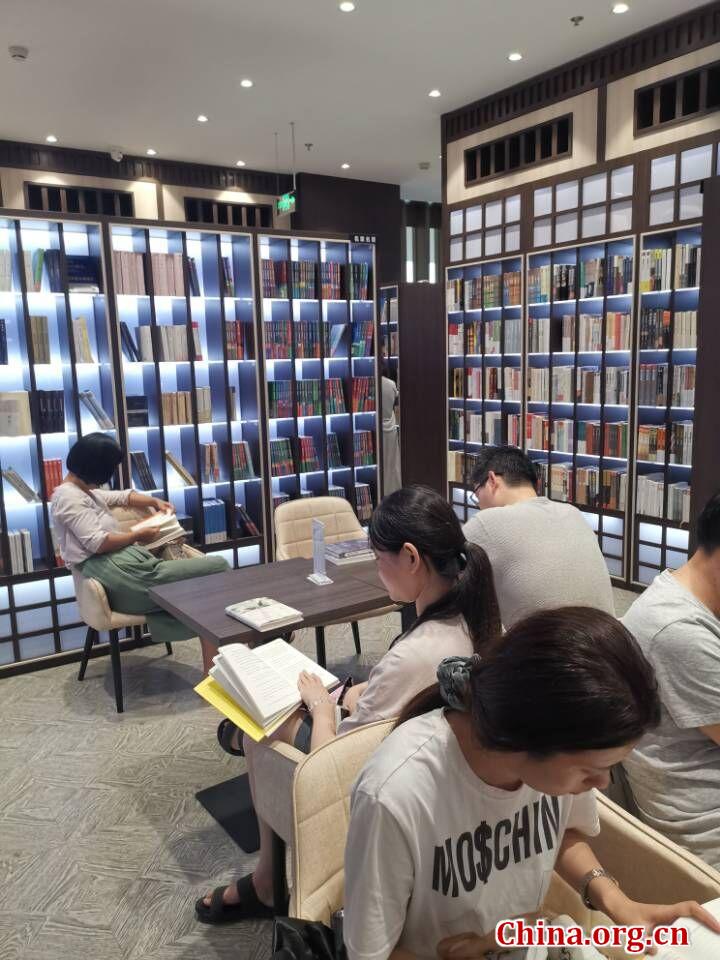Bookstores seek to bring people back to traditional reading
- By Wu Jin
 0 Comment(s)
0 Comment(s) Print
Print E-mail China.org.cn, August 14, 2019
E-mail China.org.cn, August 14, 2019

Books have long been considered a beacon of intelligence and the fountain of knowledge, playing an important role in fostering civilized societies.
In his essay entitled "Companion of Books," the Scottish author Samuel Smile (1812-1904) wrote: "A man may usually be known by the books he reads as well as by the company he keeps."
There is also an equivalent Chinese proverb: "People's loftiness and wisdom come from the poems and books they read."
However, nowadays, the habit of sitting down for a serious read of a book from the first page to the last has been challenged by digitalized technologies with which the publications can be spontaneously accessed in a paperless form. Reading, focused on short and instant articles shared by social media networks, has become hazy and fragmented and there is less patience in enjoying "a good read."
Formed by a distinctive culture passed down from one generation to another by means of education and reading, China, like many other countries, is feeling the pulse of the change.
In 2008, the giant German publishing house Bertelsmann AG retreated from the Chinese market and, only three years later, the domestic O2 Sun Bookstores closed its entire chain across the country.
Over the past few years, it's become extremely rare to see a passenger spotted holding a book while taking a subway ride in the country. For most of the time, metro railways are crowded with the people busily flipping through the on-screen content of their smart phones.
At a time when the extinction of printed books saw a foreseeable and irreversible trend, Jin Hao, a headmaster-turned-cultural entrepreneur, is bucking the trend by establishing the country's extraordinarily beautiful chain of bookstores, Zhong Shu Ge (literately translated as an "attic for book lovers"), in an attempt to revive traditional reading.
According to Jin, he hopes the aesthetic beauty of each unique deco design for different bookstore locales can attract even the least enthusiastic visitors to realize the charm of reading.
"Despite the dazzling transformation of the book market, I strongly believe in the sustainability of books and knowledge. As long as people are still reading and still seeking knowledge, brick-and-mortar bookstores will not perish," Jin said in an exclusive interview with China.org.cn.
"However, the emergence of the Internet and smart phones have engendered fundamental changes of our lifestyle. Therefore, a bookstore, which should be innovative, flexible and prescient if it wants to survive in modern society, must overhaul its model from the external to the internal."
In 2013, Jin launched the first Zhong Shu Ge in Thames Town, in Shanghai's suburban Songjiang District.
Yu Ting, the store's architect, recalls: "I thought the idea was crazy. Why set up a physical bookstore 43 kilometers from Shanghai's downtown?"
However, unable to resist Jin's sincere request, Yu decided to work on the task, though, with two prerequisites - Jin's complete trust and his full support for the architect's innovative designs.
The 600-square-meter bookstore has now been evaluated as China's most beautiful oasis for reading and quickly went viral online with days of its opening. The maximum daily visits reached a level of around 6,000 during the first few weeks.
The two-story bookstore is divided into nine different sections, each with a salient focus. On the ground floor, dark-brown wooden bookshelves stand above the glass floor beneath which an extensive number of books are arrayed. Close to one of the bookshelves is a staircase that enables visitors to pick up any books available as they climb each step.
The second floor offers brighter hues. In one of its sections, a room with an arched ceiling is painted white. A log-made bookshelf resembling the shape of a camel is placed at the children's reading area. In addition, to create a reader-friendly atmosphere, the ubiquitous chairs and tables are arranged in several blocks and the aroma of freshly-brewed coffee sold from the café corner tantalizes visitors' taste buds.
Jin explains: "Impressed by the first sight of the beautiful architecture, the visitors, particularly those who rarely read, are encouraged to linger. It is at that moment I hope they can become mesmerized by the hobby of reading."






Go to Forum >>0 Comment(s)